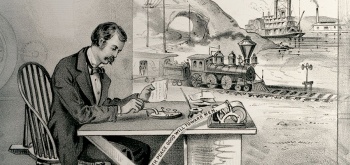Previously named: Mental and Moral Philosophy and Political Economy
Established: 1970
History: The study of Economics began at UNB as a facet of the study of 'Political Economy'. This subject first appeared in the university's academic calendar in 1863; in that year, honours students in their senior year could study Chambers' Political Economy. In 1872, 'Political Economy' is listed under the regular course of study for 'English Language and Literature and Mental and Moral Philosophy' in the senior year of a Bachelor of Arts for the first time. 'Political Economy' continued under this heading until 1886 when it was elevated to departmental status and formed the Department of 'Mental and Moral Philosophy and Political Economy', but the listing of the ordinary course for a Bachelor of Arts in the calendar shows the course requirements as credits for 'Philosophy' overshadowing the 'Political Economy' section of the department. In this year the study of the 'economics of industry' became part of the mandatory course of study for senior year students and further study could be done at the honours level.
In 1891, 'Political Economy' became listed for the first time in the course requirements for a Bachelor of Arts without being referred to as simply 'Philosophy', even though the two disciplines remained a conjoined department. The Department of 'Mental and Moral Philosophy and Political Economy' continued to give courses in Economics but it was not until 1894 that the sub-headings of 'Political Science' and 'Economics' were recognized within the department. By 1897, Economics specifically was being offered as an elective stream of study listed in the course requirements in the fourth year of a Bachelor of Arts while still remaining under the same department. Even though Economics and Political Science began to be recognized at the individual course level, on a broader scale the two were still difficult to distinguish between. This remained the same as courses considered Political Science one year could be listed as Economics the next. It was not until the 1932-33 academic year that the Department of 'Economics and Politics' was created and each discipline was recognized respectively at the departmental level. That year five Economics courses were offered as electives to students in third and fourth years as well as three courses offered to honours students. The joint department continued until 1970 when a separate department of Economics was formed, and the course offering grew to twenty-three undergraduate Economics classes. By 1980, the course offerings had risen to fifty-five classes and over the subsequent thirty years there were small fluctuations in the numbers but never any notable growth. In the academic year of 2012-2013 the course offering from the department of Economics continued to be fifty-five classes.
Physical location: Singer Hall
Faculty: Arts
Notes: The year that a certain department was established can be a subjective figure. For the purpose of this wiki, the year that a department is considered first established is the first year it was listed in the academic calendar as an independent chair with no other affiliation, unless there is documentation to demonstrate otherwise.
Source(s):
- UNB Calendars (UA RG 86), 1862, 1863,1872, 1886-1900, 1910, 1920, 1933, 1940, 1945, 1950, 1960, 1970, 1975, 1980, 1990, 2000, 2013.
-- 7 March 2013 (ADT)
- Main Page
- Anniversaries
- Brief History of UNB
- Buildings
- Faculties & Departments
- Governance and Administrative Positions
- Lecture Series
- Official University Events & Symbols
- People of UNB
- Plaques, Monuments, & Structures
- Prizes and Awards
- Sports & Athletics
- Student Clubs & Societies
- Student Events & Escapades
- University Publications
- Women's Sports at UNB
- About UNB Archives and Special Collections
Request an Appointment
Prior arrangements must be made for the retrieval of this material. Please email archives@unb.ca to make an appointment.
Procedures
Help Desk Hours
- Monday - Friday
- 10:00 am - 12:00 pm
- 1:00 pm - 4:00 pm
Contact Us
- 5th Floor, Harriet Irving Library
- University of New Brunswick
- 5 Macaulay Lane, Box 7500
- Fredericton, NB E3B 5H5 Canada
- archives@unb.ca
- Staff Directory
